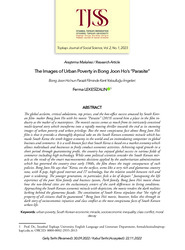The Images of Urban Poverty in Bong Joon Ho’s “Parasite”
-
Yazar
Ferma Lekesizalın
-
Tür
Makale
- Yayın Yılı 2023
-
Yayıncı
DergiPark
- Dergi Topkapı Sosyal Bilimler Dergisi / Topkapı Journal of Social Science (TJSS) 2, ( 1 ), pp.115 - 122
- Tek Biçim Adres https://hdl.handle.net/20.500.14081/2068
-
Konu Başlıkları
Urban poverty
South Korean economic miracle
Socioeconomic inequality
Class conflict
Moral decay
The global acclaim, critical adulations, top prizes, and the box-office success amassed by South Korean film-maker Bong Joon Ho with his movie “Parasite” (2019) secured him a place in the film industry as the maker of a masterpiece. The movie’s success comes as much from its intricately conceived multi-layered story which transforms into a rapidly moving thriller towards the end as its stunning images of urban poverty and urban privilege. But the most conspicious fact about Bong Joon Ho’s film is that it provides a thoroughly skeptical take on the South Korean economic miracle which has made South Korea the tenth biggest economy in the world and an intimading competitor in global business and commerce. It is a well-known fact that South Korea is based on a market economy which allows individuals and businesses to freely conduct economic activities. Achieving rapid growth in a short period through guaranteeing profit, the country has enjoyed global success in various fields of commerce including high technology. While some political scientists consider the South Korean miracle as the result of the smart macroeconomic decisions applied by the authoritarian administration which has governed the country since early 1960s, the film shows the tragic consequences of such policies. Bong Joon Ho says that “Korea, on the surface, seems like a very rich and glamorous country now, with K-pop, high-speed internet and IT technology, but the relative wealth between rich and poor is widening. The younger generation, in particular, feels a lot of despair.” Juxtaposing the life experience of the poor Kim family and business tycoon, Park family, Bong Joon Ho’s movie shows how the neo-liberal cities are the exclusionary centers of the stark differences in living conditions. Approaching the South Korean economic miracle with skepticism, the movie renders the dark realities lurking behind the glamorous facade. The constitution of South Korea stipulates that “the right of property of all citizens shall be guaranteed.” Bong Joon Ho’s movie, however, belies this through its dark story of socioeconomic injustices and class conflict as the most conspicious facts of South Korean urban life.
-
Koleksiyonlar
Fakülteler
İktisadi İdari ve Sosyal Bilimler Fakültesi

 Tam Metin
Tam Metin

